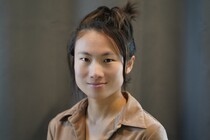Events
Apr 22, 2024
Seminar (2024-04-22)
School of Biomedical Sciences cordially invites you to join the following seminar:
Date: 22 April 2024 (Monday)
Time: 11:00 am – 12:00 nn (HKT)
Speaker: Dr. Bing Wu, Scientist, Genentech Inc.
Talk Title: Overloading and unpacking (OAK) enables higher throughput single-cell profiling
Zoom link: https://hku.zoom.us/j/93216029508?pwd=MXhkemRNUnV1MDhscVRyaVRVNTI2QT09
Meeting ID: 932 1602 9508
Password: 529118
Biography

Dr. Wu earned her Ph.D. in Biology and Biomedical Informatics from Stanford University, where she harnessed genetic tools to study neurodevelopment. Following this, she joined Chan Zuckerberg Biohub in San Francisco, where she cultivated expertise in the field of single-cell sequencing. Transitioning from academia to industry, she then took on a role as a scientist at Genentech Inc, where she is part of the Research and Early Development team. Dr. Wu's current research is centered on the innovation of sequencing-based technologies tailored for massive scale and multiomic profiling of diverse cells and tissues. She also applies these technologies in various areas of human biology research and drug discovery, including functional genomics screening and investigations focused on drug resistance.
Abstract
Single-cell sequencing is a prevalent technique for investigating cellular diversity in complex biological systems. While existing droplet-based microfluidic methods have significantly advanced the field, they also generate cell-free droplets and underutilize their barcoding capacities. Conversely, combinatorial indexing on microplates, though more efficient in barcode utilization, requires laborious protocols. To address these limitations, we have developed “Overloading And unpacKing” (OAK), integrating droplet barcoding with combinatorial indexing to yield single-cell data at a massive scale with reduced cost and labor. With OAK, we have tracked transcriptomic responses to a RAF inhibitor from 1,000 lineages of melanoma cells, and identified a rare cell population that underwent a sequence of transcriptomic changes and acquired resistance. Ultra-high throughput, broad compatibility with diverse molecular modalities, high detection sensitivity, and easy experimental procedures distinguish OAK from previous methods, and render OAK a powerful tool for multiomic single-cell profiling.
ALL ARE WELCOME
Should you have any enquiries, please feel free to contact Miss Crystal Chan at 3917 6830.

